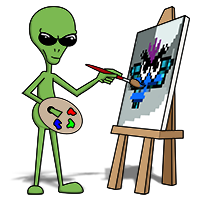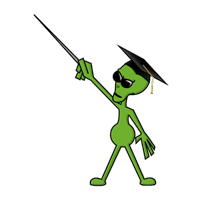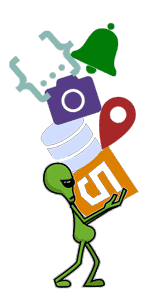Update 9/30/2024
While trying out NotebookLM, I used its “Deep dive conversation” feature to generate a podcast style discussion about this article. I think it captured the theme very well. Have a listen:
The integration of Generative AI into the creative process has great potential to revolutionize the way artists approach their work. While some may view it as a shortcut or a crutch, I believe it offers invaluable assistance, particularly for hobbyists like myself. Generative AI provides the means to overcome technical challenges and streamline the creation of complex elements, allowing artists to focus on their core vision and creative expression.
Throughout my work, I have incorporated a green Zeta Reticulian character named Alpha. Alpha serves as both a trademark and a creative outlet. In the past, I used him as a visual embellishment for other projects, but recently, I’ve started to develop him as an independent creative endeavor. Generative AI has become an essential part of my process, filling in the gaps in my developing talent. Here’s a detailed look at how I incorporate AI into my art and the benefits it brings.
Generating Reference Material
One of the most significant ways AI assists in the creative process is by generating reference material. Generative AI tools like ChatGPT Plus with Dall-E and Midjourney can replace stock photo and clip art libraries, providing unlimited material on demand. Reference images help with realism, and the study of technique. Particularly for me, where I often have difficulty translating real-life images into line art.
- Stock Art: “Incognito” is a drawing of Alpha sporting a trench coat. Cloth is particularly hard for me and I needed some help in translating the folds and flow of the coat into solid lines. In the past I would have spent hours on Google Image Search looking for other examples of cartoon coats. I’d find some that were “close enough” to adapt to my goal. With ChatGPT Plus, I was able to render several images of the exact coat I wanted, in the exact pose I wanted.

- Posing Assistance: When working on a piece involving Alpha taking a selfie, I struggled with how to naturally pose the character. By using ChartGPT Plus to generate various images of a character taking a selfie, I could better visualize the pose and the composition, ensuring a more realistic final piece. This process not only saved time but also improved the overall accuracy and appeal of the pose. The AI generated images also helped me visualize the dynamics of positioning a character with a giant sign in the background.
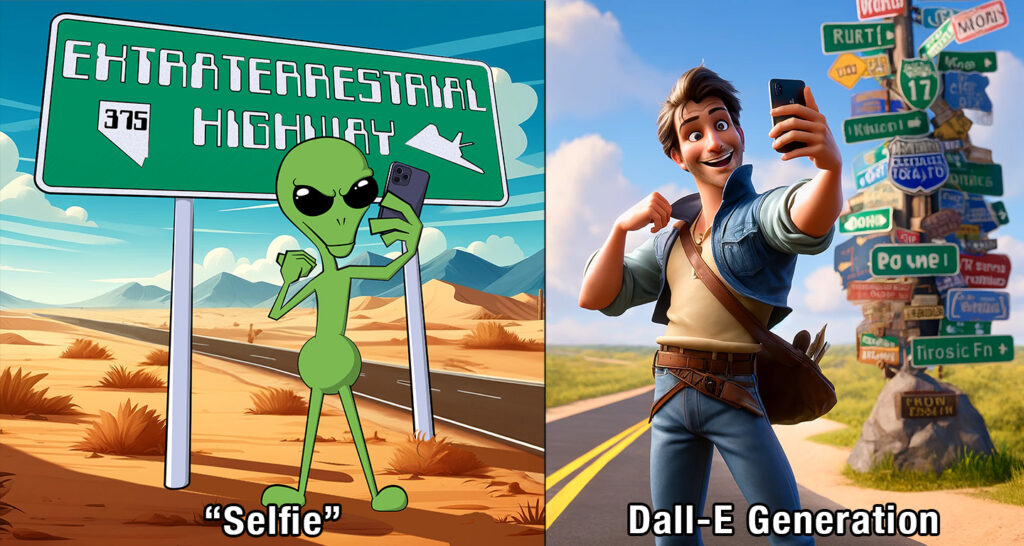
Creative Assistance
Generative AI doesn’t just stop at providing reference material; it also aids in refining compositions and poses.
- Different Perspectives: I like to do seasonal things, and I’ve always felt that Thanksgiving never gets its due. I thought it would be great to do Alpha as a Macy’s parade balloon. In my mind, the image was from the perspective of a spectator, looking up at the balloon coming from down the street. In generating a background for the piece, that kind of three-quarter perspective proved impossible for Dall-E. However, these images made me realize that my original composition was very passive. I redrew the art to fit the background, and the result is much more interesting.

- Compositional Insights: AI can offer new perspectives on composition. I had created a work titled “Double Exposure”, in which Alpha hoaxes a flying saucer photo. I was dissatisfied with its flat, two-dimensional design. My mind was hung up on Alpha standing beside the camera, creating lots of negative space. By asking GPT-4 to generate a similar image, I gained insights into a more dynamic composition. Instead of Alpha holding the saucer beside the camera, the AI suggested holding it over the camera, adding depth and interest to the artwork.
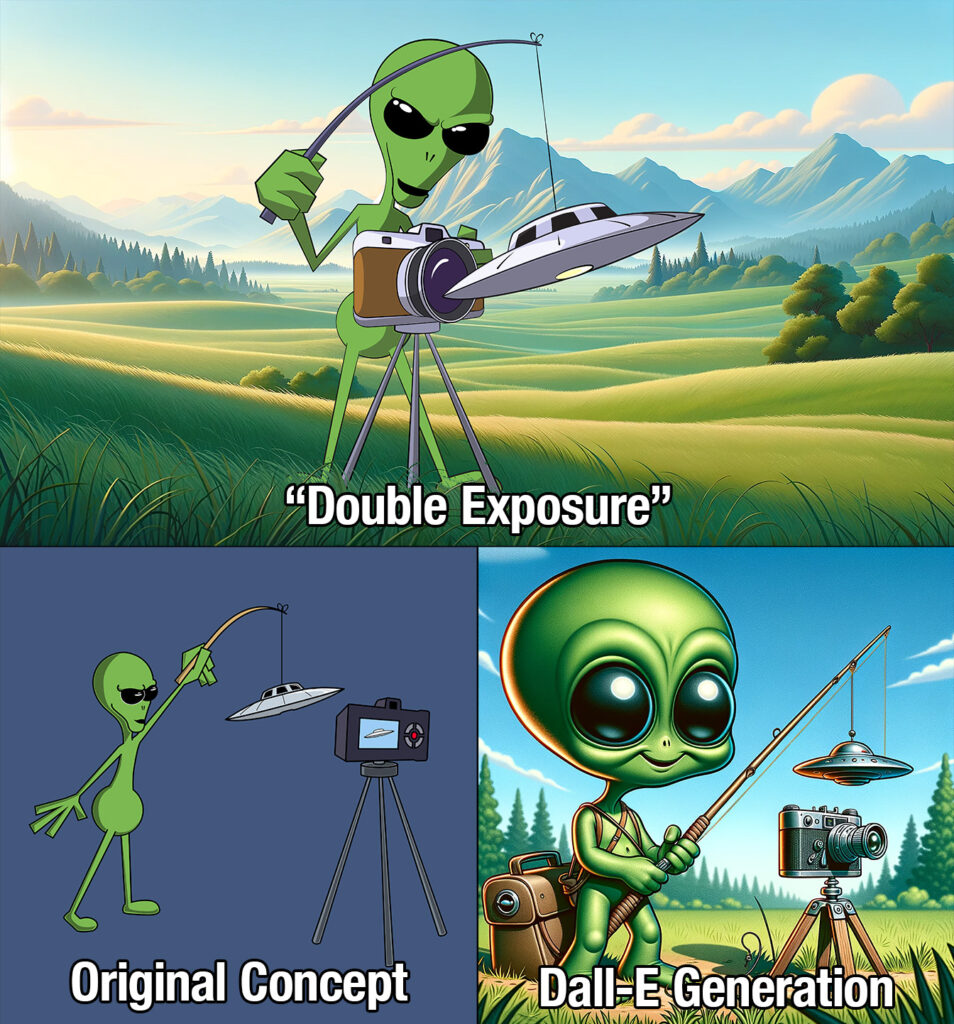
Creating Complementary Material
AI also helps generate complementary elements that enhance the main artwork. As with the reference material, it offers an unlimited supply of stock photography and clip art. Rather than using it to generate entire images it can be used as part of a crafted image.
- Background Generation: Because my focus is in the character art, generative AI allows me to quickly create backgrounds for my character. I employ a custom GPT to generate backgrounds in a 3:1 aspect ratio, capturing the vibrant and detailed style of animated cartoons. This approach ensures that my characters are set against engaging and visually consistent backdrops that I otherwise wouldn’t be able to create.
- Image Cleanup: Generative AI is all about embracing the happy accident. You never get exactly what you expect. But often an image is too good to pass up. Specialized generative tools like Adobe Firefly make edits much easier. They’re very good at removing unwanted elements. And equally good at adding additional elements in a matching style.
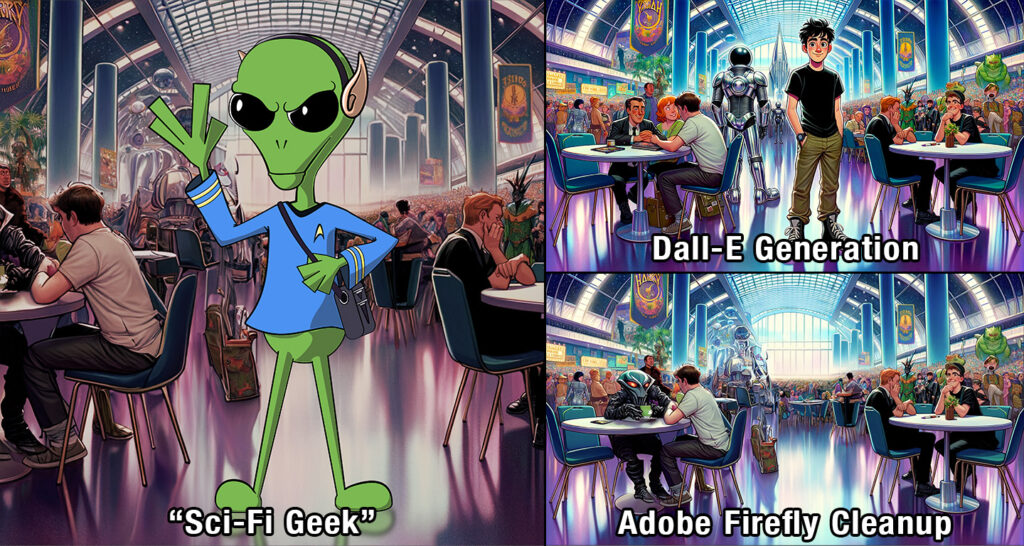
Generative AI is not just a tool for creating production images; for me, it is an invaluable asset in the creative process. It complements my artistic skills, provides essential reference material, enhances compositions, and generates backgrounds that fit seamlessly with my style. While some may dismiss it as “lazy”, I see it as a powerful ally that expands my creative potential and allows me to focus on the artistic aspects I enjoy most. By integrating AI into my workflow, I can produce higher quality work more efficiently, ultimately pushing the boundaries of what I can achieve as an artist.




